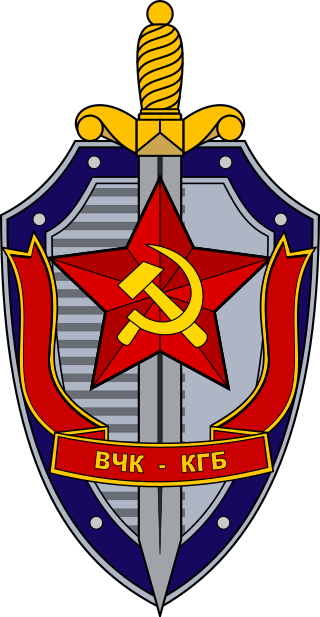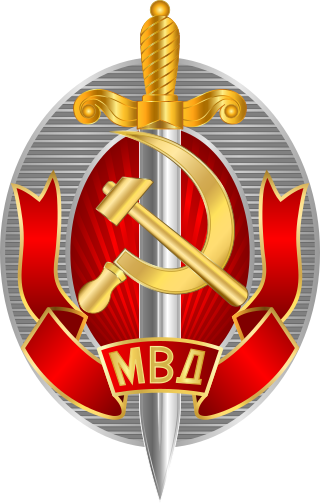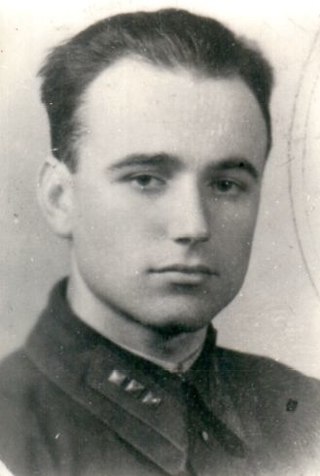Related Research Articles

The General Police Inspectorate is the national civilian police force of the Republic of Moldova. It is a state institution subordinated to the Ministry of Internal Affairs, that regulates law enforcement in Moldova. The current Chief of the General Police Inspectorate is currently Viorel Cernauteanu.

The Moldavian Soviet Socialist Republic or Moldavian SSR, also known as the Moldovan Soviet Socialist Republic, Moldovan SSR, or simply Moldavia or Moldova, was one of the 15 republics of the Soviet Union which existed from 1940 to 1991. The republic was formed on 2 August 1940 from parts of Bessarabia, a region annexed from Romania on 28 June of that year, and parts of the Moldavian Autonomous Soviet Socialist Republic, an autonomous Soviet republic within the Ukrainian SSR.

The First Main Directorateof the Committee for State Security under the USSR council of ministers was the organization responsible for foreign operations and intelligence activities by providing for the training and management of covert agents, intelligence collection administration, and the acquisition of foreign and domestic political, scientific and technical intelligence for the Soviet Union.
The MGB, an initialism for Ministerstvo gosudarstvennoy bezopasnosti SSSR, was the name of the Soviet state security apparatus dealing with internal and external security issues: secret police duties, foreign and domestic intelligence and counterintelligence, etc. from 1946 to 1953.

Petru Lucinschi is a former Moldovan politician who was Moldova's second President from 1997 to 2001. He currently serves as the founder and head of the Lucinschi Foundation of Strategic Studies and International Relations.
Semyon Denisovich Ignatiev was a Soviet politician, and the last head of the security forces appointed by Joseph Stalin.

This timeline of events is a chronological list of incidents and other notable occurrences related to the War of Transnistria, including events leading up to the war.

The Ministry of State Security is the Transnistrian state security service.

The Committee for State Security (CSS) was the main security agency for the Soviet Union from 13 March 1954 until 3 December 1991. As a direct successor of preceding agencies such as the Cheka, GPU, OGPU, NKGB, NKVD and MGB, it was attached to the Council of Ministers. It was the chief government agency of "union-republican jurisdiction", carrying out internal security, foreign intelligence, counter-intelligence and secret police functions. Similar agencies operated in each of the republics of the Soviet Union aside from the Russian SFSR, where the KGB was headquartered, with many associated ministries, state committees and state commissions.

Ivan Ivanovich Bodiul was a Soviet and Moldovan politician prominent in the Moldavian SSR, particularly during the Brezhnev era.
Nikita Leontyevich Salogor was a Moldavian and Soviet politician who served as First Secretary of the Communist Party of Moldavia (PCM) in 1942–1946. Of Romanian Ukrainian or Moldovan roots, he had a kulak mother, whom he openly denounced later in life. Salogor's early career was in agricultural institutions of the Ukrainian SSR and the Moldavian Autonomous Soviet Socialist Republic, where he also advanced politically. Following the Soviet advance into Bessarabia in 1940, he joined the leadership of the Moldavian SSR. Immediately promoted to Junior Secretary of the PCM, he was co-opted on its Politburo in early 1941, and took part in a workforce recruitment drive, which is described by historian Ion Varta as connected to the deportation of native Romanians.
Alexandru Șoltoianu was a Moldovan orientalist, activist and a political prisoner in the former Soviet Union.
The National Patriotic Front was a clandestine political party in the Moldovan SSR.

Ion Ciubuc was a Moldovan economist and politician who served as the 3rd Prime Minister of Moldova from January 1997 to February 1999.
Igor Cașu is a historian from the Republic of Moldova.

The Ministry of Internal Affairs of the USSR was the interior ministry of the Soviet Union from 1946 to 1991.
Piotr Vladimirovich Chvertko was a Soviet politician who was the 4th Chairman of the KGB of the Kirghiz SSR (1961-967) and of the Moldavian Soviet Socialist Republic (1967-1975).

The KGB of the Ukrainian SSR was a state committee of the Ukrainian Soviet Socialist Republic and a regional predecessor of the Security Service of Ukraine, a republican part of All-Union Committee for State Security. After the adaptation of the Constitution of the Ukrainian SSR (1978), it possessed a ministerial authority.
Committee for State Security of the Moldavian Soviet Socialist Republic, also referred to as the KGB of the MSSR or the CSS of Moldavia, was the security agency of the Moldavian Soviet Socialist Republic, being the local branch of Committee for State Security of the USSR. On 9 September 1991, the KGB of the MSSR was transformed into the Ministry of National Security. Established in 1954, its rights were limited by the early 1960s, with the KGB border guard, once subordinated to the Moldavian KGB, reported directly to party leaders in Moscow. From July 1972 to its disbandment, the KGB was part of the Council of Ministers of the MSSR. From 1940 to 1991, all chairmen of the KGB were army generals. Today, modern Moldovan intelligence services are mostly based on the structure of the KGB, specifically its 5th Division.

Semyon Kuzmich Tsvigun was a Soviet officer of the KGB whose sudden and unexplained death heralded a major shift in Kremlin power politics.
References
- Teodor Botnaru, Alexandru Ganenko. Istoria Serviciilor secrete. Breviar. Chişinău. Ed. Museum, 2004, pp. 93–94
- Karl de Leeuw, J. A. Bergstra (2007). The history of information security: a comprehensive handbook . Elsevier. ISBN 0-444-51608-5.
- A. I. Kolpakidi, M. S. Seriakov (2002, in Russian). Щит и меч (Schit i mech) . Olma Press. ISBN 5-7654-1497-4.